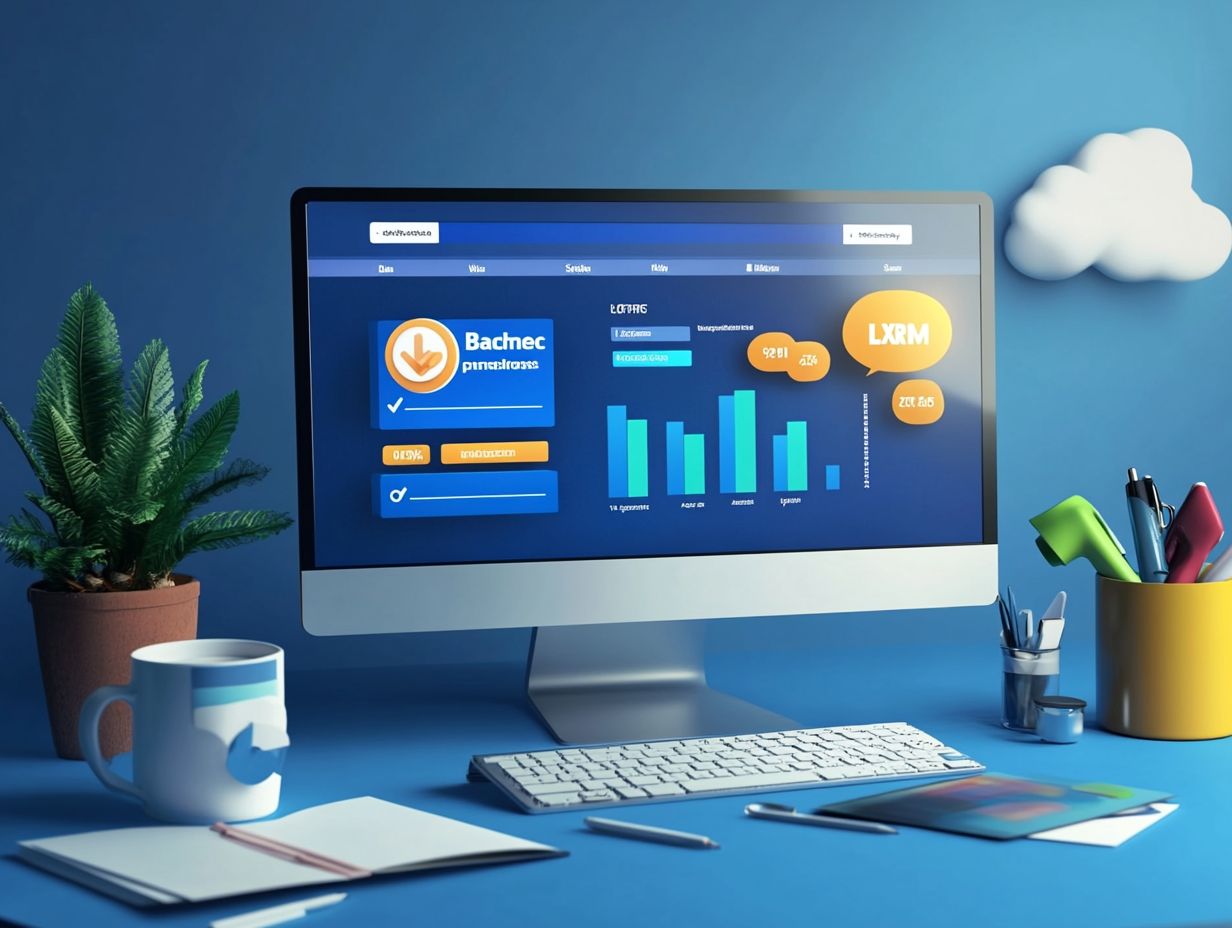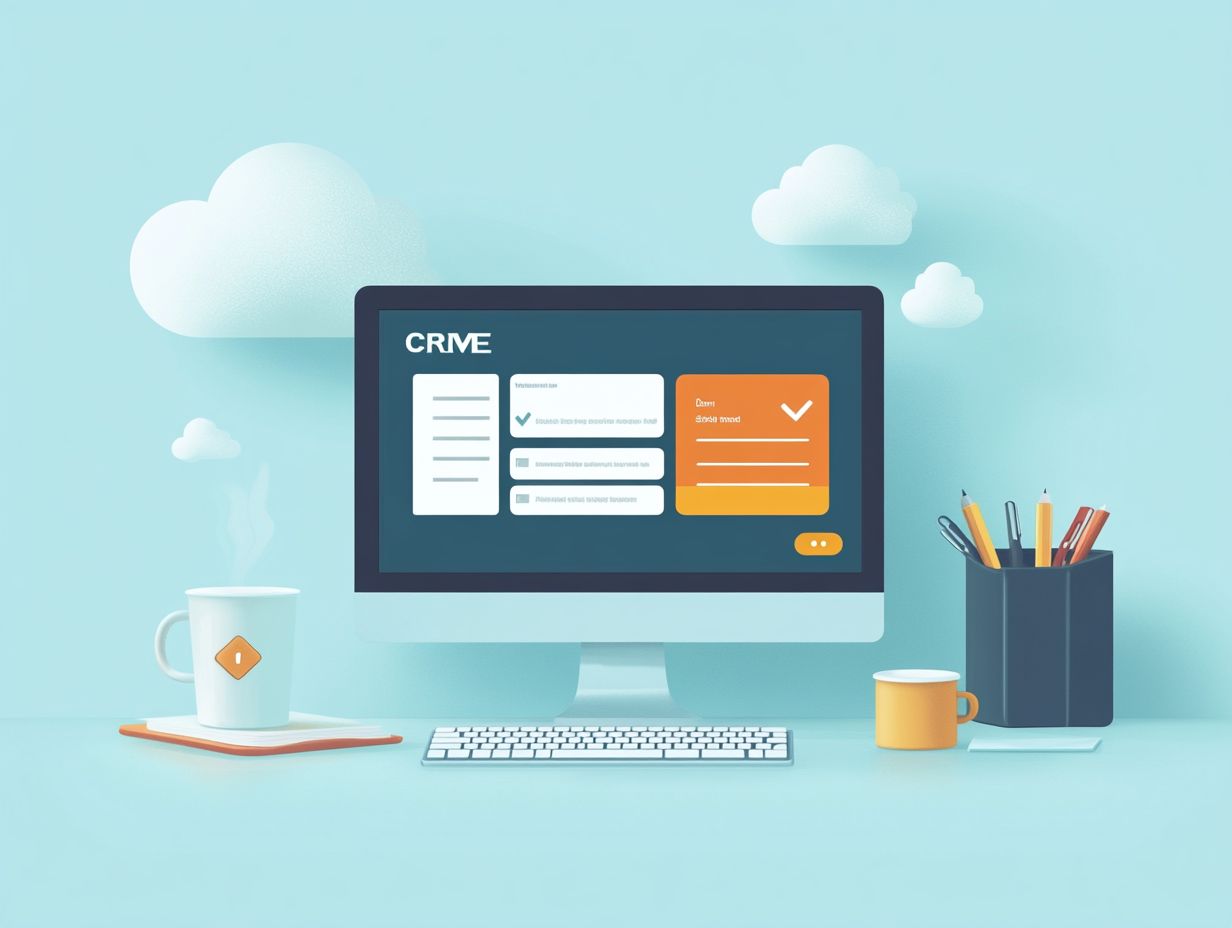Best Practices for CRM Data Backup
In today s digital landscape, customer relationship management (CRM) systems are indispensable for your business’s success. But what happens when that critical data goes missing?
Understanding the nuances of CRM data backup is crucial, as it acts as a protective shield against potential disasters that could jeopardize your operations.
This article delves into the significance of backing up CRM data, outlines the risks of overlooking this essential practice, and provides you with best practices to keep your data secure.
It will also address common pitfalls to steer clear of, empowering you to prioritize CRM data backup with confidence.
Continue reading to uncover how you can safeguard your invaluable information.
Contents
- Key Takeaways:
- Why is CRM Data Backup Important?
- Best Practices for CRM Data Backup
- Common Mistakes to Avoid
- Frequently Asked Questions
- What are the best practices for CRM data backup?
- How often should I back up my CRM data?
- Where should I store my CRM data backups?
- How can I ensure the accuracy of my CRM data backups?
- What Should I Include in My Disaster Recovery Plan for CRM Data Backup?
- Should I Back Up Only My CRM Data or the Entire CRM System?
Key Takeaways:

Regular and consistent backups are crucial in ensuring CRM data is always protected from potential risks and disasters. Choosing the right backup method and storing backups in secure locations are essential best practices for CRM data backups to minimize the chances of data loss. Testing backups, having a disaster recovery plan, and prioritizing CRM data backup are common mistakes to avoid for a successful and reliable backup system.
What is CRM Data Backup?
CRM data backup is the careful process of copying and archiving customer information stored in your Customer Relationship Management (CRM) system. This ensures that vital data is preserved and can be restored in the unfortunate event of data loss or corruption.
Organizations using CRM platforms like HubSpot or Scratchpad need to back up their data. These tools are critical for managing customer relationships and driving sales.
In today’s digital landscape, safeguarding customer data is paramount, given the looming threats of data breaches and system failures. Effective CRM data backup not only shields sensitive customer information but also supports your data governance efforts, ensuring compliance and integrity across your operations.
By leveraging advanced data management tools, you can streamline your backup processes, automate regular updates, and maintain multiple secure copies of your data. This proactive approach mitigates the risk of data loss while enhancing the reliability of your customer relationship strategies.
Why is CRM Data Backup Important?
CRM data backup is essential for your business, safeguarding you against potential data loss, enhancing privacy, and ensuring the integrity of customer interactions. Implementing best practices for segmenting your CRM database is also vital for making informed decisions.
By keeping your data accurate and reliable, you can sidestep the pitfalls of poor data quality that could derail your marketing campaigns and damage customer relationships.
Potential Risks of Not Backing Up CRM Data
Failing to back up your CRM data exposes your organization to substantial risks, including data loss, breaches, and compromised customer information all of which can severely disrupt your operations and erode customer trust.
Without regular backups, you may encounter significant hurdles in recovering lost data, jeopardizing your ability to maintain strong customer relationships.
The consequences of neglecting CRM data protection can be severe; take the infamous Equifax data breach in 2017, for instance, which compromised sensitive information for millions and resulted in hefty fines and a severely damaged reputation.
It s not just about breaches, either. Poor data quality stemming from unbacked systems can lead to misguided assumptions about customer preferences, ultimately derailing your marketing strategies and costing you revenue.
When your teams lack reliable data, they risk missing valuable insights, turning what could be satisfied clients into unhappy ones. The financial implications of data recovery can be astronomical, underscoring the urgent need for routine backups to safeguard your organization s future.
Best Practices for CRM Data Backup

Implementing best practices in CRM data management isn’t just necessary; it’s a game-changer! Secure, organized data helps you make quick, informed decisions that propel your business forward.
These practices not only streamline your data backup efforts but also guarantee that your customer information remains secure and easily retrievable when needed. This ultimately supports you in making informed business decisions with confidence.
Regular and Consistent Backups
Regular backups are critical to protect your CRM data. They keep your customer information safe from unexpected loss, and following the best practices for CRM integration strategies can further enhance your data security.
Establishing a backup routine lets you maintain high data quality and streamline integration across your systems. Try to back up your data daily, adjusting based on how much you update or transact.
Automated tools and cloud solutions can make the process even smoother. They reduce your manual workload while keeping your data secure and accessible.
Integrating frequent backups into your workflow not only protects your data but also boosts operational efficiency. This proactive approach helps you recover quickly and keeps your business running smoothly during disruptions.
Choosing the Right Backup Method
Choosing the right backup method is crucial for protecting customer data. Evaluate different tools and find what fits your needs.
Every backup method has pros and cons that can impact data privacy and recovery. For example, cloud storage offers easy access and off-site security but can raise concerns about data breaches. Local backups provide greater control and faster recovery but come with risks like hardware failures.
Make sure you evaluate these factors carefully, including compliance with data protection laws, so your backup method aligns with your recovery strategy.
Storing Backups in Secure Locations
Storing backups in secure locations is essential to protect sensitive customer information. Always consider regulations like GDPR when deciding how to store your CRM data.
Use best practices for backup storage to reduce risk. Consider encrypted drives in secured places and reliable cloud systems that offer end-to-end encryption and regular audits.
Understanding where your data resides and ensuring compliance with local laws about data transfer is crucial. This multi-faceted strategy not only secures your vital information but also builds trust with customers who expect their data to be handled responsibly.
Common Mistakes to Avoid

Avoiding common backup mistakes is key for data quality. A solid disaster recovery plan can help you handle data loss effectively.
This plan should address potential data quality issues and outline strategies for managing customer interactions after data loss incidents. This not only protects your information but also enhances your organization’s resilience during tough times.
Not Testing Backups
One of the most critical mistakes you can make is not testing your backups regularly. This oversight can lead to severe data quality issues when it’s time to recover important information.
Without routine testing, you might find that your Customer Relationship Management (CRM) data backups are corrupted or incomplete. This jeopardizes your efforts to maintain strong customer relationships. The ramifications of this negligence can be devastating lost revenue, diminished customer trust, and extended downtime during crucial moments.
To mitigate these risks, it s essential to establish a structured testing schedule, ideally on a monthly or quarterly basis. By assessing backup integrity and completeness through simulated recovery scenarios, you can ensure that your data access remains reliable.
This proactive approach not only safeguards your data but also fosters a culture of accountability and preparedness within your organization. Neglecting these tests can create a false sense of security, leaving you vulnerable during actual emergencies when the inadequacy of your backups could lead to significant operational setbacks.
Not Having a Disaster Recovery Plan
Failing to establish a disaster recovery plan can have catastrophic effects on your ability to recover customer data and maintain operations during a data loss incident. A comprehensive plan should clearly outline procedures for data management and recovery, ensuring that your organization can swiftly restore functionality and protect customer information.
It s crucial to assess potential risks and vulnerabilities, considering various scenarios such as natural disasters, cyber-attacks, or hardware failures. This foresight enables you to develop tailored strategies that not only prioritize data recovery but also encompass communication protocols and employee training.
Adopting best practices, including regular testing and updates to your plan, is essential. The technological landscape is constantly evolving, and without a robust disaster recovery strategy, you expose your business to prolonged downtimes and financial losses. This ultimately jeopardizes customer trust and your overall reputation in the market.
Importance of Prioritizing CRM Data Backup
Prioritizing CRM data backup is crucial for cultivating strong customer relationships and driving sales growth. It ensures you always have accurate and reliable information at your fingertips.
By integrating effective data governance practices with strategic backup solutions, you significantly enhance your ability to make informed business decisions.
Recognizing the importance of a robust backup strategy not only protects critical data but also boosts your overall operational efficiency. Properly backed-up CRM data enables your teams to swiftly recover from unexpected disruptions, maintaining continuity in customer interactions and marketing initiatives. For more insights, consider exploring best practices for CRM technical support.
To further elevate your data management, regularly auditing your backup processes, adopting automated solutions, and training your staff on best practices for data security are essential steps.
By embracing these actionable insights, you can safeguard customer data and foster trust, ultimately leading to increased customer loyalty and sales growth.
Frequently Asked Questions

What are the best practices for CRM data backup?
The best practices for CRM data backup include regularly scheduled backups, storing backups in a secure location, testing backups for accuracy, and having a disaster recovery plan in place.
How often should I back up my CRM data?
It is recommended to back up CRM data regularly, such as daily or weekly, depending on the volume and importance of the data. Following the best practices for CRM software configuration will help ensure that any data loss can be minimized.
Where should I store my CRM data backups?
CRM data backups should be stored in a secure location, preferably off-site or in the cloud, to protect against physical damage or loss from natural disasters.
How can I ensure the accuracy of my CRM data backups?
Regularly testing backups for accuracy is essential to ensure that data can be restored successfully in the event of data loss. This can be done by restoring the data to a test environment and verifying its integrity.
Call to Action: Implement these best practices for CRM security and compliance today to protect your valuable customer information and maintain operational integrity!
Summary:
Testing backups, having a disaster recovery plan, and prioritizing CRM data management are essential steps in safeguarding your organization and fostering customer loyalty. Regular audits and updates will ensure your efforts remain effective!
What Should I Include in My Disaster Recovery Plan for CRM Data Backup?
Include a clear process for restoring your data after a disaster. Designate a team to implement this plan.
Regularly review it to keep it effective.
Should I Back Up Only My CRM Data or the Entire CRM System?
Backing up just the CRM data is important. However, you should also back up the entire CRM system, including any custom settings.
This ensures full restoration if a disaster strikes.






